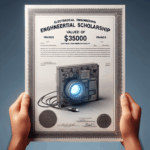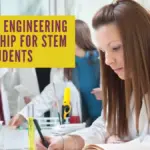
The Unseen Ladder: My Personal Quest for Chemical Engineering Scholarships
My journey into the world of chemical engineering wasn’t a sudden epiphany; it was more like a slow, simmering realization. I remember sitting in my high school chemistry class, utterly captivated by how raw materials could be transformed into something entirely new and useful. It wasn’t just about mixing chemicals; it was about understanding the fundamental processes, the invisible forces, and then, crucially, scaling them up to make a real impact. I saw a future where I could contribute to sustainable energy, life-saving medicines, or even better food production. This wasn’t just a career; it felt like a calling.
But then, reality hit me like a cold splash of water: the cost. Chemical engineering degrees, especially from reputable universities, aren’t cheap. The thought of accumulating a mountain of student debt before even starting my professional life was daunting, to say the least. My family, while supportive, couldn’t shoulder the entire burden. That’s when I realized that if I wanted to pursue this dream, I’d have to find an unseen ladder – a way to climb towards my goals without being crushed by financial pressure. That ladder, I quickly learned, was built from scholarships.
Looking back, the scholarship search felt like navigating a dense, uncharted jungle. I knew there were treasures hidden within, but I had no map, and the sheer volume of information was overwhelming. "Where do I even begin?" I asked myself countless times. My first steps were clumsy, filled with false starts and moments of despair. I’d type "chemical engineering scholarships" into a search engine and be greeted by millions of results, most of which seemed generic or irrelevant. It felt like trying to find a specific grain of sand on a vast beach.
My initial approach was scattershot. I applied for anything that vaguely mentioned "engineering" or "science," without really understanding the specific criteria. This, I learned the hard way, was a waste of precious time and effort. It was like trying to fit a square peg into a round hole, hoping it would somehow magically transform. The rejections, when they started rolling in, were disheartening. Each "We regret to inform you…" email felt like a tiny pinprick in my balloon of hope.
But I wasn’t one to give up easily. The passion for chemical engineering was too strong. I decided to change my strategy, to be more deliberate, more focused. I started thinking about the different kinds of scholarships out there, trying to categorize them in my mind to make sense of the chaos.
The first major category I encountered was merit-based scholarships. These are the ones everyone talks about: awards for academic excellence. My grades were good, my test scores respectable, so I thought this would be my strongest suit. I spent hours perfecting my GPA, enrolling in challenging AP classes, and studying diligently for standardized tests. For these, universities often automatically consider you when you apply for admission, but there are also external organizations that look for top-tier students. I learned that even within merit-based awards, some were specifically for STEM fields, and a precious few were tailored for chemical engineering. These required detailed transcripts, sometimes essays explaining my academic journey and future aspirations, and glowing letters of recommendation from my science and math teachers. I vividly remember asking my chemistry teacher, Ms. Jenkins, who knew my passion better than anyone, for a letter. Her words of encouragement were a scholarship in themselves.
Then there were need-based scholarships. This was where my family’s financial situation came into play. These awards are given to students who demonstrate a financial need to attend college. This meant filling out lengthy forms like the FAFSA (Free Application for Federal Student Aid) and CSS Profile, detailing every aspect of my family’s income, assets, and expenses. It felt intrusive, almost like laying bare our financial soul, but it was a necessary step. I learned to gather all the required tax documents, bank statements, and investment records well in advance, because these applications had strict deadlines and required meticulous attention to detail. It was less about what I had achieved and more about proving what I needed to achieve my dreams.
As I dug deeper, I discovered the true gems: scholarships specifically for chemical engineering students. This was the gold mine I had been searching for! Professional organizations like the American Institute of Chemical Engineers (AIChE) were a fantastic resource. They offer various scholarships to students at different stages of their academic careers, from freshmen to graduate students. These scholarships often look for more than just good grades; they want to see a genuine interest in the field, involvement in related activities, and a clear vision for how you’ll contribute to chemical engineering. I also found that many large companies in the chemical, oil and gas, pharmaceutical, and consumer goods industries (think Dow, ExxonMobil, Procter & Gamble) offer their own scholarships to attract future talent. These often come with the added benefit of potential internships or even future employment opportunities. Applying for these felt more personal; I had to articulate why chemical engineering, why their company’s values resonated with me, and how I saw myself making a difference.
Beyond these, I stumbled upon diversity and minority scholarships. These are designed to support students from underrepresented groups in STEM fields, aiming to foster a more inclusive and diverse engineering workforce. I also looked into location-specific scholarships – awards offered by local community organizations, state programs, or even alumni groups from my high school or future university. These often had less competition and were sometimes easier to secure because they were looking for students from a very specific geographic area or background. It was a good reminder that not all big opportunities come from big names; sometimes, the most accessible help is right in your own backyard.
The application process itself became a journey of self-discovery. Each scholarship application, I realized, was an opportunity to tell my story.
Research, Research, Research: This became my mantra. I stopped relying on generic searches and started targeting specific sources. University chemical engineering department websites often listed their own departmental scholarships or linked to external ones. Professional organizations became my allies. Scholarship aggregators and databases, once overwhelming, became manageable when I filtered them meticulously by major, academic standing, and eligibility criteria. I created a spreadsheet to track deadlines, requirements, and my application status for each one. This was crucial; missing a deadline meant instant disqualification, no matter how brilliant my essay or grades.
The Essay: Oh, the essays! These were the heart of many applications. Initially, I struggled. I tried to sound overly intellectual or use jargon I barely understood. But then, I had a breakthrough. I realized they weren’t looking for a textbook definition of chemical engineering; they wanted to hear my story. I started writing about my fascination with renewable energy, how a visit to a local wastewater treatment plant sparked my interest in environmental engineering, or how a simple science fair project on creating biodegradable plastics ignited my passion for material science. I learned to weave my personal experiences, my struggles, and my triumphs into a narrative that showcased my genuine passion for chemical engineering. I focused on showing, not just telling, my commitment and curiosity. I wrote about the time I accidentally stained my mom’s kitchen counter during a home experiment and what I learned from that mistake. It made me human, relatable, and, I hoped, memorable.
Recommendations: Choosing who to ask for recommendation letters was also important. I didn’t just pick the teacher with the highest academic title; I picked teachers who knew me well, who could speak to my character, my work ethic, and my specific interest in science and math. I learned to ask early, provide them with my resume, a list of the scholarships I was applying for, and a clear explanation of why I wanted to pursue chemical engineering. This made their job easier and resulted in stronger, more personalized letters.
Transcripts and Test Scores: These were straightforward. Requesting official transcripts from my high school and ensuring my standardized test scores were sent directly to the scholarship committees were administrative tasks that, while tedious, were non-negotiable.
Resume/CV: Even as a high school student, I learned to craft a resume that highlighted my academic achievements, relevant coursework, extracurricular activities, and any work experience, no matter how seemingly unrelated. Babysitting taught me responsibility, a summer job at a local diner taught me problem-solving under pressure – these were transferable skills that showed I was a well-rounded and capable individual. I tailored my resume for each scholarship, emphasizing experiences that aligned with their specific criteria.
What truly made an applicant stand out, I discovered, went beyond just numbers. It was about demonstrating a genuine, vibrant interest in the world around you and how you could contribute to it.
Extracurriculars: I wasn’t just a student; I was a participant. I joined my school’s science club, even if it meant staying late on a Friday. I volunteered at a local animal shelter, which taught me empathy and organizational skills. I took on leadership roles where I could, like being the editor of the school yearbook. These activities showed I was engaged, curious, and capable of balancing multiple responsibilities – traits highly valued in any demanding field like engineering.
Projects/Research: Even small projects counted. My participation in the regional science fair, where I explored different catalysts for a chemical reaction, wasn’t just a line on my resume; it was a tangible demonstration of my proactive approach to learning and my hands-on engagement with chemical principles. If you have the chance to participate in a summer research program, even a small one, seize it!
Work Experience: Any job, paid or unpaid, offers valuable lessons. Whether it was stocking shelves at a grocery store or helping my neighbor with their garden, I learned to articulate the transferable skills gained: problem-solving, time management, teamwork, communication. These skills are universal and show maturity and readiness for the rigors of university life and a demanding field.
Demonstrating Passion: This was the most intangible yet most crucial element. It wasn’t enough to say "I’m passionate about chemical engineering." I had to show it. Through my essays, my recommendations, and my activities, I tried to paint a picture of someone who genuinely loved the subject, who was excited by its possibilities, and who was eager to learn and contribute. It was about conveying that spark, that genuine curiosity that fueled my desire to pursue this path.
For some scholarships, there was an interview stage. My first scholarship interview was a nerve-wracking experience. I remember my hands sweating, my voice trembling slightly. But I had prepared. I researched the organization, reviewed my application, and thought about common interview questions: "Why chemical engineering?" "What are your strengths and weaknesses?" "Where do you see yourself in five years?" I practiced articulating my thoughts clearly and concisely. The key, I learned, was to be myself, to show my enthusiasm, and to ask thoughtful questions at the end, demonstrating my engagement and interest. It wasn’t just about giving the "right" answers, but about connecting with the people across the table and showing them the real me.
Of course, not every application resulted in a "yes." I faced my share of rejections, and each one stung. It was easy to get discouraged, to question my abilities. But I learned to view it as a numbers game. The more scholarships I applied for, the higher my chances of success. I celebrated every "yes" with immense gratitude and used every "no" as motivation to refine my approach for the next application. Persistence, I realized, was my secret weapon. The joy of receiving that first acceptance letter for a scholarship, knowing that a significant portion of my tuition was now covered, was an unforgettable feeling of relief and triumph. It was the moment I knew my unseen ladder was truly being built.
Even after securing scholarships, the journey wasn’t over. I learned the importance of maintaining eligibility by keeping up my grades and fulfilling any specific requirements. I made an effort to network with donors and scholarship committees, sending thank-you notes, providing updates on my academic progress, and sometimes even meeting them in person. It wasn’t just good manners; it was a way to build relationships and show appreciation, which could open doors to future opportunities. And finally, I always kept in mind the idea of paying it forward. My dream, once a heavy financial burden, was now supported by the generosity of others. I knew that one day, I hoped to be in a position to help another aspiring chemical engineer climb their own unseen ladder.
If you’re reading this and dreaming of a future in chemical engineering, but the cost feels like an insurmountable wall, please know this: the wall can be climbed. The resources are out there, waiting to be discovered. It won’t always be easy, and there will be moments of doubt and frustration. But with careful research, persistent effort, and a willingness to tell your unique story, you can find the support you need. Don’t let financial worries dim your passion. Start your search early, be meticulous, be authentic, and never, ever give up on that dream. Your unseen ladder is waiting to be built, rung by rung.


